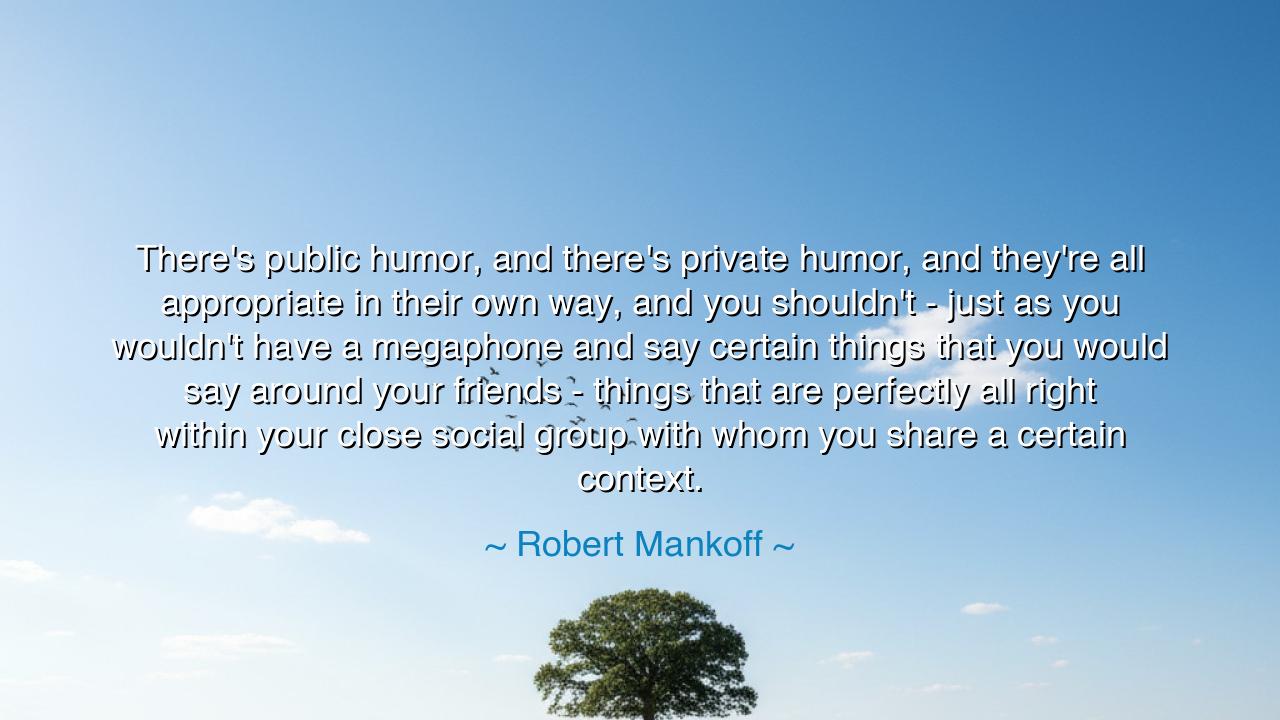
There's public humor, and there's private humor, and they're all
There's public humor, and there's private humor, and they're all appropriate in their own way, and you shouldn't - just as you wouldn't have a megaphone and say certain things that you would say around your friends - things that are perfectly all right within your close social group with whom you share a certain context.






When Robert Mankoff said, “There’s public humor, and there’s private humor, and they’re all appropriate in their own way, and you shouldn’t — just as you wouldn’t have a megaphone and say certain things that you would say around your friends — things that are perfectly all right within your close social group with whom you share a certain context,” he was not merely describing the art of comedy; he was speaking of wisdom, discernment, and the sacred boundaries of human connection. His words remind us that not all truths, and not all laughter, are meant for every ear. There is a time to jest openly, and a time to keep humor sacred within the circle of understanding hearts. For humor, like fire, warms when contained — but burns when it spreads without care.
The meaning of this quote reaches beyond the stage of comedy and into the heart of human interaction. Mankoff, a longtime editor and cartoonist for The New Yorker, understood that humor lives within context. The same words that provoke laughter among friends can wound or bewilder strangers. In a close circle, humor is bound by trust — by shared history, tone, and affection. It is a form of intimacy, a secret language built from years of knowing one another’s hearts. But when lifted from that private soil and scattered across the open air, that same humor can lose its root and turn brittle. Thus, Mankoff teaches that awareness is the soul of communication — that to speak wisely, one must first understand not only what to say, but to whom it is being said.
The ancients too understood this delicate art of balance. The philosopher Aristotle spoke of kairos — the right word at the right time, spoken to the right audience. He warned that virtue, even in speech, is found in moderation. Likewise, Socrates used humor and irony only with those ready to engage in reason, never with those who could not yet understand his intent. In this way, the ancients knew that laughter, when misapplied, can become cruelty; but when shared among equals, it becomes enlightenment. It was never the jest itself that carried power, but the relationship in which it was delivered.
History gives us countless examples of how misunderstanding humor can bring chaos. Consider the court of King Henry II, who once jested that he wished to be rid of his archbishop, Thomas Becket. His knights, hearing these words, took them as command and slew Becket in the cathedral. What was meant, perhaps, as a frustrated remark among intimates became, when misheard, a tragedy that shook a kingdom. Words, even when spoken in jest, carry weight beyond intention. Mankoff’s insight warns us of this — that to share a private jest in a public forum is to hand one’s heart to those who do not hold its context, and thus, cannot protect it.
The origin of Mankoff’s quote lies in his long career surrounded by humorists — men and women who understood that laughter is a double-edged sword. In private rooms, comedians and writers test the edges of truth, pushing the boundaries of what can be said. But once their words leave the sanctuary of shared understanding, they enter a world that may not forgive what it cannot comprehend. His warning is not against humor itself, but against carelessness — against the belief that all speech is free of responsibility. Like the philosopher’s wisdom, or the poet’s song, humor must be guided by awareness.
What Mankoff describes is also the ethics of empathy. To recognize the difference between public and private humor is to honor the humanity of others — to understand that not all hearts are shaped alike, not all experiences are shared. The wise speaker, like the wise friend, measures their words with compassion. They know when laughter will unite and when it will divide. The fool, by contrast, wields humor without understanding, mistaking boldness for brilliance. Yet, as Mankoff reminds us, humor without sensitivity is not courage — it is arrogance. True wit is the art of knowing your audience, of honoring the sacred spaces of belonging and difference.
So, my listener, let this be your lesson: guard your words as you would guard a flame. Let your humor be kind, and let it serve connection, not division. When among friends, let your laughter flow freely, for in shared understanding there is healing. But when among strangers, speak with care. Do not shout private truths into the public wind. Remember that every joke carries your character, every word your intention. As the ancients said, “The tongue is small, yet it can destroy a city.” Speak, then, as one who builds rather than breaks.
And in the end, understand this — humor is holy, for it holds the power to unite or to wound. Use it as the wise do: with love, with awareness, and with humility. As Robert Mankoff teaches, laughter is not only an act of expression — it is an act of trust. Know the difference between the laughter of friendship and the laughter of the crowd, and honor both. For when humor is spoken in the right place, to the right hearts, it becomes not just a sound of joy, but a language of peace.






AAdministratorAdministrator
Welcome, honored guests. Please leave a comment, we will respond soon